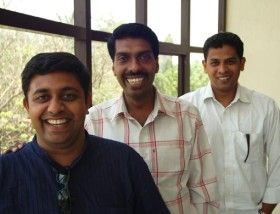English theatre gets no funding from the government in Bangalore, India, and is viewed by most as an elitist pastime
When meeting Bangaloreans who work in theatre full time, I'm scared I'll find them slowly starving to death. But Sibu Vaz is happy and well fed and is recommending a book.
It's not, as I would have expected, Brecht, Pinter or the Natyashastra; he is pushing Cashflow Quadrant: Rich Dad's Guide to Financial Freedom by Robert Kiyosaki.
He's just finished the business book, and instead of chain-smoking over coffee and chatting about art and metaphor, Sibu has just bought lunch and is discussing business models and financial vision.
Sibu is one of a trio of classmates from Christ College Bangalore who run a theatre group called The Script. He, Rajesh P. I. and Arif Mohammad were the first to bring playback theatre (an improvisational form) to Bangalore. The group also runs Theatre in Education (TIE), a programme that conducts workshops for students and teachers.
English-language theatre has always held an uneasy position in Bangalore. It gets no funding from the government and is viewed by many people as an elitist pastime. Theatre groups rarely make money, and survive off sponsorship and the occasional workshop.
Today, it's not uncommon to run into people who declare that they "do theatre" to earn their daily bread. But theatre means many things, and it's still improbable that somebody can survive as an actor or director only. So these full-timers turn to the corporate or education sector, and use training to fuel their art.
"It was difficult initially," says Rajesh, the only one of the trio who worked elsewhere in the early years. But is it a comfortable living now?
They nod, and there's a whiff of smugness in the air.
They have a right to be proud, though. They had to fight off family and a host of critics who assured them they'd be crying for office jobs within a couple of weeks.
Today, they are setting up their own office in a space provided by Christ College. Their workshop calendar is full and they've just finished a high-budget, highly attended performance that went better than expected. They have the enviable luxury of being able to live off something they truly love.
Some of that luxury comes from the boom that has hit the IT and BPO sectors, resulting in spin-offs that reach far down the system. There are, for example, more single executives new to the city who actively look for social and recreational networks.
A desultory office picnic is no longer enough. They are hungry for models that provide team-building, stress-busting and the improvement of presentation skills, in a package at least nominally disguised as fun.
Dramatic presentations
This is usually where Rahul George and Meenakshi Mehta come in with their company, Join the Dots. The venture is a success story of regular corporate theatre workshops and twice-monthly dramatic presentations that are open to the public.
"It's a huge market that is largely untapped," says Rahul, who has a business background and is a graduate of one of Sibu, Rajesh and Arif's workshops. The Join the Dots roster has grown fast and in less than two years, Rahul is able to say of his career choice: "It is lucrative."
With so much global business coming to the city and so many people joining companies young, the need for training is growing tenfold, she says. While many companies have their own trainers, they often find that a single methodology doesn't work for everybody.
The "experiential method" of Join the Dots is described in its tagline: Making theatre work for you. This emphasis on "you" is crucial because Rahul and Meenakshi never come in with a generic plan.
They spend as many as 10 or 12 days talking to a company first, finding out what it wants, and then developing a workshop method to deliver this goal subtly and effectively.
Join the Dots also conducts themed standalone workshops that have been such a success that they have their own version of the Deadheads - people who follow them around to every "concert". One of them is Musten Jiruwala the CEO of ITMust Consultancy Services.
"I joined because I wanted to live life completely, I wanted an active personal hobby," he says. He credits the first workshop with helping him overcome his difficulty with verbal communication. Now he goes back again and again to de-stress and to get in touch with his creative side.
Another regular is Karthik Ramdas who is a subject-matter expert at Fidelity Investments. He says the workshops have helped him overcome a stammer and also finds them a good way to de-stress.
The Script trio is less thrilled by its corporate experience however. Sibu, Rajesh and Arif believe that working the corporate sector is difficult because companies use specific people for specific tasks.
"If they need voice training, they use specific voice trainers," says Rajesh. "If they need team building, they tend to have outdoor activities."
Rahul, surprisingly, agrees with this. He stresses that Join the Dots' success is because it is a training company that uses theatre, as against a theatre group that conducts training. It can be a difficult line to draw, but apparently one that makes all the difference.
"Also," says Rahul, "there was a time that outbound was the thing - to send people out and get them to rappel down a mountain. Now people are looking for something beyond. Like anything it's a cycle."
Vivek Madan is probably the best person to comment on cycles. He was the first of this generation of Bangalore's theatre people to take it on full time.
Now, seven years later, he's moving back to regular work - at what Rahul and Meenakshi may well say is the wrong time. Vivek, though, has found himself caught between theatre training and pure theatre.
Logistical support
He founded Harlequin Entertainment, a company that conducted workshops and provided logistical support to groups staging plays.
But breaking into the corporate world wasn't as easy for him as it had been for the two successful training groups he mentions - one run by playwright and author Vijay Nair, and the other Join the Dots.
"Vijay has a very distinct advantage in that he comes from a management as well as a theatre background. He has the best of both worlds, so he is often more trusted than just a theatre person would be. Rahul also has that advantage," says Vivek.
In Vivek's experience, it has always been a huge challenge to meet the right people at companies. And the few times he has been able to create a working relationship, his supporter in the company has moved on. It's a problem that The Script trio also found.
The market growth that was driving their business was also making it harder to establish it.
Vijay Nair, the playwright, and author of the novel Master of Life Skills (Harper Collins, India), didn't have to tussle. In 1999, he was thrown straight out of the money into the art by a nervous breakdown - one he ascribes totally to "working in the corporate world".
He hit a terrible low and freely talks about his subsequent depression and sessions with pill-happy therapists. Then he discovered theatre, and today, writing and theatre serve as therapy for him.
Even as one novel is released, he has another ready in the wings. Also, he gives back to the world that broke him by conducting training courses with the Tata Group, a heavyweight business and manufacturing conglomerate.
Every two months there is a programme of about ten days that works around an organisational issue.
This, says Vijay, is the key. A pure theatre workshop would be impossible to sell. The company must always have its goal served. Vijay, who often pairs up with a pure theatre person, weaves those goals into scripts that workers enact and the plays travel to various plants and offices as an education tool.
In spite of these admissions, the corporatisation of theatre has irked some pure theatre practitioners. A young Bangalore actor who preferred not to be identified, questioned Rahul and Meenakshi's credentials because they have never staged a proper play.
She had attended one of their performances and thought it "criminal that they actually charged money for that load of #%*@".
Sibu, Rajesh and Arif did not comment on Join the Dots, but heaped scorn on "Page Three types" who think they can practice theatre without proper long-term training. (A popular newspaper in India carries its 'around town' pictures of beautiful people at fashionable events on page three.)
"People don't realise how much goes into theatre," says Sibu. "They think they can call people over just to do anything. Also, the aura of theatre protects them. Having somebody lead you through exercises can fool you into thinking they know what they are talking about."
The key to lasting in this field is stated repeatedly by all three of them.
A group must have a clear objective. Rajesh says: "We have been going for 11 years actively, 13 years in total. Our growth has not been linked with the boom, but with a gradual building up of contacts and resources."
Sibu, still flushed by his reading of Kiyosaki's book, warns: "The boom is real, but the rest is illusory. Some people are riding on it, but without a long term vision, they will be gone in a year."




